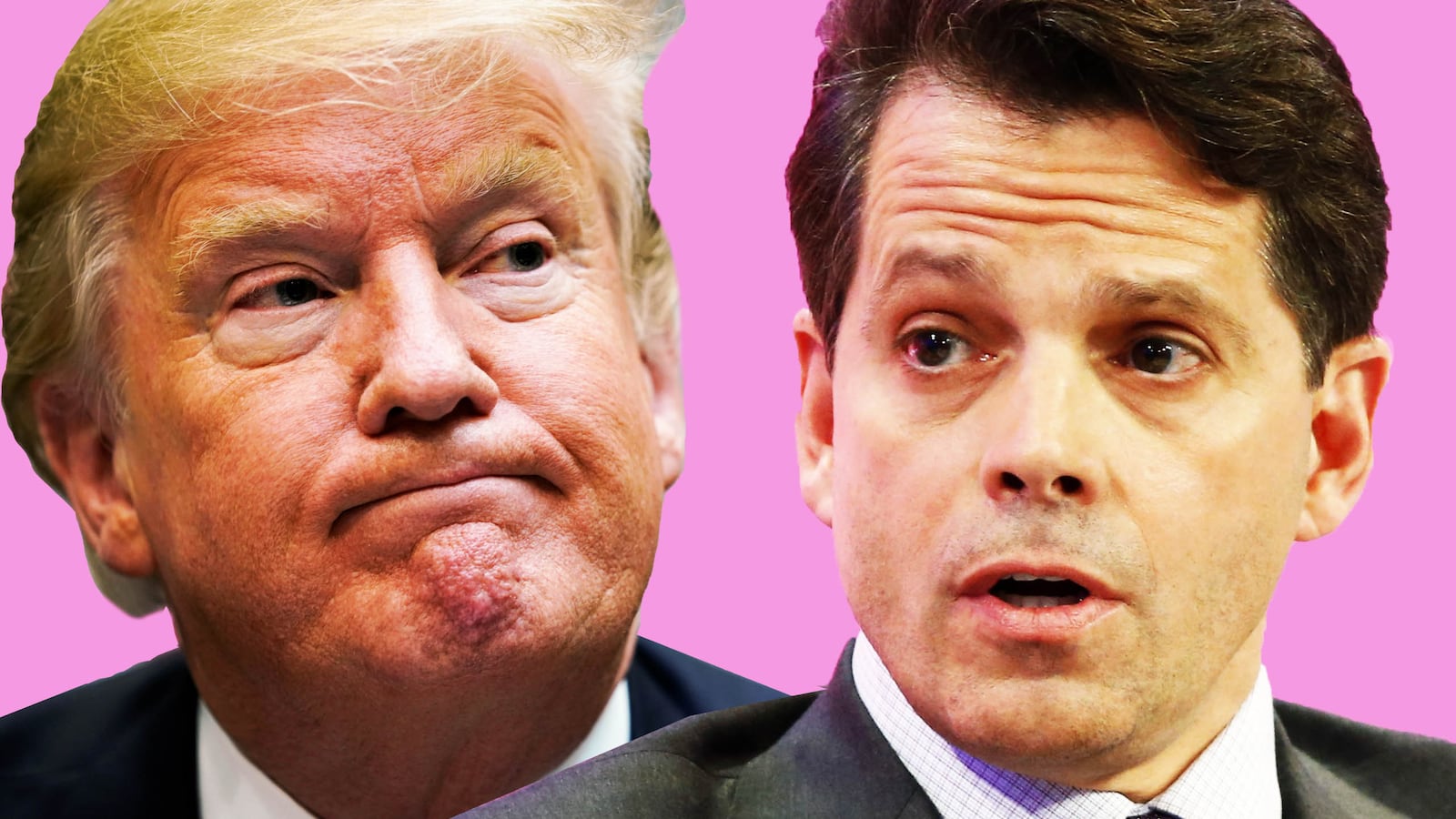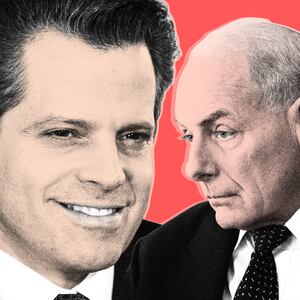Shortly after Donald Trump’s election, a Disney crew was dispatched to the White House to record the new president’s voice, which would be played through an animatron at Disney World’s Hall of Presidents. It was a typical rite of passage for a new president. But Trump was thrilled by the idea. He also had an odd request.
Trump wanted his robotic likeness to tell Disney-goers that Americans had invented the skyscraper and to remind them of his own career in real estate.
“Then I could add a little, ‘Which, of course, I know a thing or two about,’ right?” Trump suggested his robot say, according to an account of his remarks in a new book, Team of Vipers, by former senior White House aide Cliff Sims.
Disney brass objected to the request, saying that Americans hadn’t actually invented the concept of a skyscraper—it’s “just a taller building,” one protested—and Sims agreed to strike the line from the pre-recorded Disney speech. But the anecdote illustrated one of the major themes that has defined the Trump era: The president, and many of his top aides, have had immense difficulty grasping the enormous duties of their office.
“This,” Sims wrote of the Disney encounter, “was a presidential duty that filled the President with unusual boyish excitement.”
Sims’ book, which the Daily Beast obtained in advance of its release next week, portrays a group of amateurs and self-promoters handed the keys to the federal government with little idea of how it functions and less interest in finding out. Most of the staffers, advisers, and hangers-on with whom the president surrounded himself appear motivated by petty grievances, triviality, and self-aggrandizement.
And that tone was set at the top.
Trump, Sims intimates, was as obsessed with his particular style of opulent presentation as he was with his actual legislative accomplishments
When Congress approved the Republican tax bill in late 2017, the president was elated at a New York Times front page story on the achievement. “We need to get this framed. Put it in a nice gold one,” he instructed staff. “In fact, any good articles you see—on anything, not just the taxes, on anything—go ahead and get them framed and we’ll put them here and there. People like that.”
Trump’s natural inclination towards public messaging as an end in itself colored his policy proposals on some of the most serious issues facing the country. To combat the opioid epidemic, for instance, Trump’s go-to solution was a violent, graphic ad campaign to scare kids away from drugs.
“We need people dying in a ditch. I want bodies stacked on top of bodies,” he instructed Sims. “Do it like they did with cigarettes. They had body bags piled all over the streets and ugly people with giant holes in their faces and necks.”
That over-the-top communications style was echoed by many of the people who went to work for Trump, and none more so than Anthony Scaramucci, the former White House comms director whose tenure lasted a tumultuous ten days (or eleven, depending who you ask).
In Sims’ book, “The Mooch” is portrayed as part court jester, part tabloid celeb, and, ultimately, part tragicomedy. Scaramucci, Sims writes, was a minor celebrity even among the White House press corps, generally accustomed to being surrounded by famous and powerful people. And Scaramucci indulged their fascination, resulting, on one occasion, in a memorable exchange about the size of his penis.
Scaramucci had just finished up an interview on the White House’s north lawn, Sims recalls, when he “was approached by several cameramen from one of the networks, each of whom wanted to take a photo with him.” As he snapped selfies, Scaramucci “put both hands on his belt buckle, leaned in close to the cameramen—all of whom happened to be African American—and said, ‘Can I tell you guys something? We’ve already hit it off, and I think I know one of the reasons why.’ Mooch paused for a few moments to build the anticipation. ‘It’s ’cause I’m black from the waist down.’”
The cameramen, according to Sims’s account, laughed “hysterically,” with one playfully exclaiming, “He’s crazy!” as Scaramucci waltzed away beaming.
Asked on Thursday if he’d like to comment about the moment, Scaramucci texted The Daily Beast: “Nah thanks though.”
A year ago, when The Daily Beast had first heard that Scaramucci had a habit of cracking this particularly joke, he had feigned ignorance, suggesting the joke “sounds racist.” When asked if that was a denial, he would only say, “I have no further comments. Ask your editor if he thinks that is a good idea to write that.” (The Daily Beast ultimately didn’t run the story on grounds that the former White House comms director’s endowment didn’t have an obvious news hook.)
Sims felt no such hesitation. Team of Vipers is packed with similarly outlandish moments with Trump during and after the 2016 presidential race—including details that are bound to make some of his former administration compatriots uncomfortable.
During his time in the White House, Sims—a former Christian-rock touring musician turned journalist turned Trump administration official—found himself at the center of all the drama, backstabbing, and antics familiar to any dweller of Trumpworld. A 2016 campaign veteran, he had enjoyed special access to the president, who affectionately called him “my Cliff,” according to a source familiar with the relationship.
And with that access came stories to tell. On Wednesday night, Vanity Fair published an excerpt of Sims’s “tell-all,” in which the author offered a firsthand account of watching the president’s counselor Kellyanne Conway leaking against fellow senior officials such as Jared Kushner, Steve Bannon, Sean Spicer, Reince Priebus—and even Trump himself. (White House Press Secretary Sarah Huckabee Sanders and Conway did not immediately respond to The Daily Beast’s request for comment on Thursday afternoon.)
When it first became clear that Sims was writing his book, President Trump took notice, fearing that the memoir could make him look bad. As The Daily Beast reported, Trump began quizzing close associates in November if “we lost Cliff?” according to two people with knowledge of these conversations.
As excerpts of the book have trickled into public view over the past week, Trump allies have sought to discredit Sims’ account by describing him as a mid-level staffer with little internal influence or access to the president. The White House still has not addressed the book on the record. But on Thursday, shortly after the Daily Beast put in a comment request, a “source familiar” did call to discuss the matter—and dub Sims an untrustworthy leaker.
In his book, Sims does not paint the president in a strictly positive or negative light. Instead, it serves to further illuminate and underscore—from first-person experience—aspects about the Trump presidency that have been breathlessly reported on by the political press. Chief among those aspects are the president’s obsessions with the media.
In Team of Vipers, Sims recounts Trump lavishing praise upon Fox Business host Lou Dobbs—at the mild expense of Sean Hannity, another Fox host and top Trump confidant.
“Lou, I’ve been thinking a lot about it and I really think you might be the best,” the president told “Lou,” according to Vipers. “I’m serious. Honest to God, Lou, I think you’re the best who’s ever done it. You’ve got a certain way that you do things. Now you know Hannity—Sean is wonderful, so good. But I honestly think you may be better. And you know why? It’s not just information, Lou. It’s great information but it’s more than that; it’s entertainment.”
As The Daily Beast previously reported, the president’s affection for Dobbs is so complete that he has even patched the TV anchor in on speakerphone during high-level Oval Office meetings. Trump has also repeatedly mocked Hannity’s interviewing style, decrying it as lazy, boring, “dumb,” and too suck-up-y, three people with direct knowledge told The Daily Beast in November.
“It’s like he’s not even trying,” Trump said, one source recalled, just before the president launched into a rough Hannity impersonation, and complaining that the host’s questions about how “great I am” give him nothing to work with.








